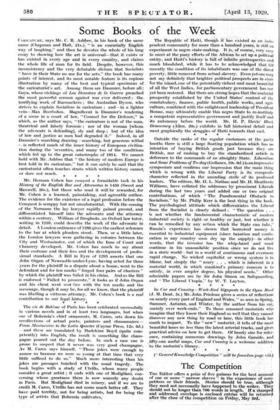Mr. Herman Cohen has essayed a formidable task in his
History of the English Bar and Atlornalus to 1450 (Sweet and Maxwell, 30s.), but those who read it will be rewarded, for Mr. Cohen is a learned, painstaking, and agreeable author. The evidence for the existence of a legal profession before the Conquest is scrappy but not unsubstantial. With the coming of the Normans the lay lawyer rapidly gained ground, and differentiated himself into the advocate and the attorney within a century. William of Drogheda, an Oxford law tutor, writing in 1289, could describe the work of the advocate in detail. A London ordinance of 1280 gives the earliest reference to the bar at which pleaders stood. Then, or a little later, the London lawyers were gathering in colonies between the City and Westminster, out of which the Inns of Court and Chancery developed. Mr. Cohen has much to say about their costume and their fees and the development of profes- sional standards. A Bill in Eyre of 1293 asserts that one John Organ of Neweastle-under-Lyne, having acted for three • years for the plaintiff in a dispute about a house, went to the defendant and for ten marks " forged four pairs of charters " by which the plaintiff was foiled in his claim. And as the Bill is endorsed " Failed to prosecute," it looks as if John Organ and his client went scot-flee with the ten marks and the messuage, though it may be, for all we know, that the plaintiff was libelling a virtuous attorney. Mr. Cohen's book is a real contribution to our legal history.


















































 Previous page
Previous page